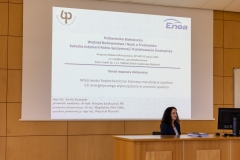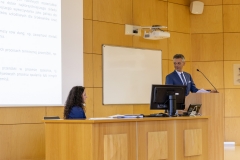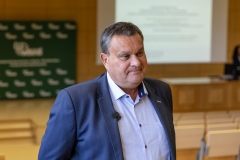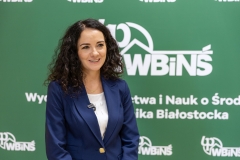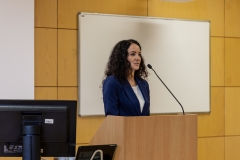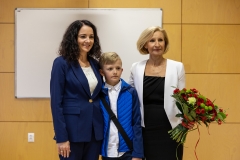Can cow dung biomass become a fuel at Bialystok Power Station? Innovative research subject of the second implementation doctorate in the history of Bialystok University of Technology
08-09-2022
– In my job I supervise research on the physical and chemical properties of cow dung biomass, hence my scientific interests and the subject of my doctoral thesis I realised in cooperation between the university and the company under the “Implementation doctorate” programme. This allowed me to conduct research both in the workplace and in the laboratories of the Faculty of Civil Engineering and Environmental Sciences – said Aneta Szymajda, MSc, Eng shortly after her successful defence.
The defence took place before the doctoral committee appointed by the Senate of Bialystok University of Technology in the composition proposed by the Council of the Discipline of Environmental Engineering, Mining and Energy at the Faculty of Civil Engineering and Environmental Sciences.
– Implementation doctorate is a unique path of scientific promotion. Although there is research involved just like in case of standard doctorate, the priority and obligation is the implementation element, which makes the implementation doctorate a valuable concept in terms of economy. There are numerous benefits: professional development of the doctoral student, contribution to increase in the scientific activities of a university as well as success for the company, which gains science-based solutions to technical problems at low cost – emphasises professor Lech Dzienis, DSc, PhD, Eng, Head of the Council of the Discipline of Environmental Engineering, Mining and Energy.
The dissertation of Aneta Szymajda, MSc, Eng named “Physical and chemical properties of cow dung biomass in the aspect of their energetic use in the combustion process” concerns the verification of usability of cow dung in commercial power generation. In the laboratories of the companies Enea Ciepło and Enea Wytwarzanie, as well as in the laboratories of the Department of Agri-Food Engineering and Environmental Management of the Faculty of Civil Engineering and Environmental Sciences of Bialystok University of Technology, Aneta Szymajda studied the physical and chemical properties of the biomass, such as humidity and ashes in analytical samples, elemental composition, heat of combustion, heating value and characteristic fusibility temperature of ashes. In the produced pellets, she determined: physical and bulk density, kinetic resistance and emissions of harmful products into the atmosphere, i.e. that of CO2, CO, SO2, NO, HCl resulting from their combustion in a low-power boiler. She also presented an economic analysis (costs and revenue) of usage of cow dung biomass as an energy fuel and indicated guidelines (with a risk assessment) for its implementation in Enea Ciepło Sp. z o.o. Oddział Elektrociepłownia Białystok.
– Bialystok Power Station is the main source of heat in the city. It has a renewable energy sources unit combusting biomass including forestry and agro-based biomass, as well as two power units combusting bituminous coal. The implementation doctorate of Aneta Szymajda assumes the possibility of combustion of cow dung biomass in energy units. Even though 1,500 tonnes of biomass are combusted each day in Bialystok and the percentage of cow dung biomass would not be particularly high, it is still a high energy fuel which can certainly be used in the future – says Wojciech Jabłoński, deputy director at Enea Ciepło Sp. z o.o. Oddział Elektrociepłownia Białystok.
Aneta Szymajda, MSc, Eng is a graduate of Environmental Protection studies at the Faculty of Civil Engineering and Environmental Sciences of Bialystok University of Technology. She also holds a bachelor’s degree in computer science from University of Bialystok and a postgraduate degree in chemical metrology from University of Warsaw. In 2018, she started her doctoral studies in the discipline of Environmental Engineering, Mining and Energy at Bialystok University of Technology under the second edition of “Implementation doctorate” programme of Ministry of Science and Higher Education. In 2021, she was awarded in the competition for the most active doctoral student of the year in terms of scientific publications – she is a co-author and author of 8 articles including 3 JCR-listed articles in „Energies, Renewable Energy” and „Przemysł Chemiczny”, journals, as well as 2 chapters in monographs and 2 articles in “Proceedings Energy”. She attended national and international conferences in the field of environmental engineering.
In her doctoral dissertation effort she was supported by Assoc. Prof. Grażyna Łaska, DSc, PhD and Magdalena Joka-Yildiz, PhD, Eng of the Department of Agri-Food Engineering and Environmental Management of the Faculty of Civil Engineering and Environmental Sciences of Bialystok University of Technology. Her work was reviewed by Prof. Jarosław Paweł Zuwała, DSc, PhD, Eng of the Institute of Energy and Fuel Processing Technology in Zabrze and Assoc. Prof. Grzegorz Zając, DSc, PhD, Eng of University of Life Sciences in Lublin.
– The subject of this implementation doctorate is innovative and universal, as the properties of cow dung have not been studied yet in the country. It should be noted, however, that it has been studied in India, where it is used to heat small households. Therefore the research we started may lead to realisation and implementation of such a biomass by Bialystok Power Station. It is of great importance especially today – in the era of increase in energy prices and constant search for new renewable energy sources. Cow dung biomass may be one of these and the company Enea Ciepło may implement it in terms of combustion as 10% of agro biomass – emphasises Assoc. Prof. Grażyna Łaska, DSc, PhD, the supervisor of the doctoral proceedings.
“Implementation doctorate” is a programme established in 2017 by the Ministry of Science and Higher Education – currently the Ministry of Education and Science. Bialystok University of Technology participated in four editions of the programme and is also applying for funding this year. Currently, 11 implementations doctorates are being carried out at three faculties of the University: Faculty of Civil Engineering and Environmental Sciences, Faculty of Electrical Engineering and Faculty of Mechanical Engineering.
by mr
